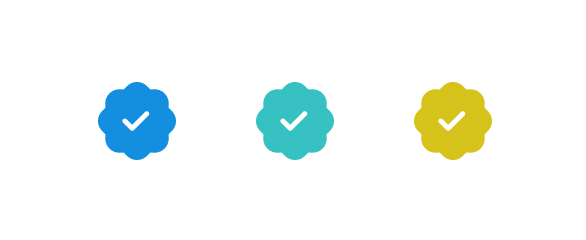The “verification badge” is one of the most coveted symbols on most social media platforms.
Being “verified” online sometimes feels like being put on a pedestal. The badge sort of elevates your social status in the online world. It sort of feels like getting a designated degree or an award.
Social media platforms like Twitter have outlined their rules for verifying individuals, companies, and brands. Instagram, Pinterest, and other social media all let you know what it takes to be verified online.
As an “average” Joe, it might feel like a lot just to prove that you are who you say you are just to get verified. Whether it’s having 10,000 followers or having your own Wikipedia page, it can feel like a hustle to prove that you’re real or a meaningful person in society. But that shouldn’t be the case.
In all honesty, we think anyone who can provide an official document proving their authenticity should be verified on a social media platform, regardless of their fame or social status.
Current Requirements For Verification Are “Outdated”
There are different rules for getting verified on different social media platforms. On Twitter, they’ve outlined its verification rules on their website.
Facebook and Instagram also have their own separate rules. But what most of these platforms have in common as being verified is that you have to be “authentic” and “well known”.

So if you think you’re authentic and a well-known person but apply and get rejected, is that fair? Some could say it is because these are public companies with their own rules.
You could be a very well-known blogger in your community in Cameroon but if you don’t have a Wikipedia page or don’t have a local story about yourself in the news, does that mean you’re not authentic and well known?
If there was a system that existed whereby you just uploaded an official government ID and a supplementary ID to confirm who you were, this could solve the problem of online “verification”.
Dating Apps Got It Right With Online Verifications
One place where everyone gets the chance to get verified is dating apps. Apps like Tinder and Bumble allow users to go through a simple process to get verified with a blue checkmark. Sending a selfie or video or sending a local ID gets you verified.

Online verification on dating apps helps a lot because it helps reduce “catfishing” which is where a user impersonates someone else by using a picture of someone else. Catfishing can be harmless but being duped online can be an embarrassing experience and can erode trust in the dating platform.
This online verification is optional but it does help people to verify who might be “real” or not on dating apps. It provides an incentive to prove who you say you are and also increases your chances of getting a date online because others will see you as a real person.
Introduce A Tier System For Verifications
In the early days of Instagram, the founders tried to elevate the platform by inviting celebrities to sign up and post pictures. Celebrities would get the “blue badge” to show that they were the real deal. It wasn’t until 2018 that Instagram allowed people to manually request to be verified on the platform.
Being “exclusive” can definitely make your personal brand more popular.
Social media platforms can still provide that “exclusive” effect if anyone can get verified. They can introduce a “Tier” system for verification.

A simple ID submission can get you verified on Twitter. But if you have 10,000 followers, are a politician, or are a big-name celebrity, you can get a different colored badge to distinguish you from everyone else.
The online verification debate for social media platforms has many layers. Verification can be optional for users if they don’t feel like getting a verification badge. But just like on Tinder or Bumble, not being verified can make you stick out like a sore thumb and reduce your social interactions.
A tier system couldn’t easily help. Give badges to everyone. A social media influencer? Give them a purple badge. A politician? An orange badge.
If someone like Elon Musk does buy Twitter, will he follow our suggestion and let anyone get verified so he can eliminate spam bots?
We’ll see what happens. Till then, that revered “Blue Check” might be up for grabs for the common folk.










